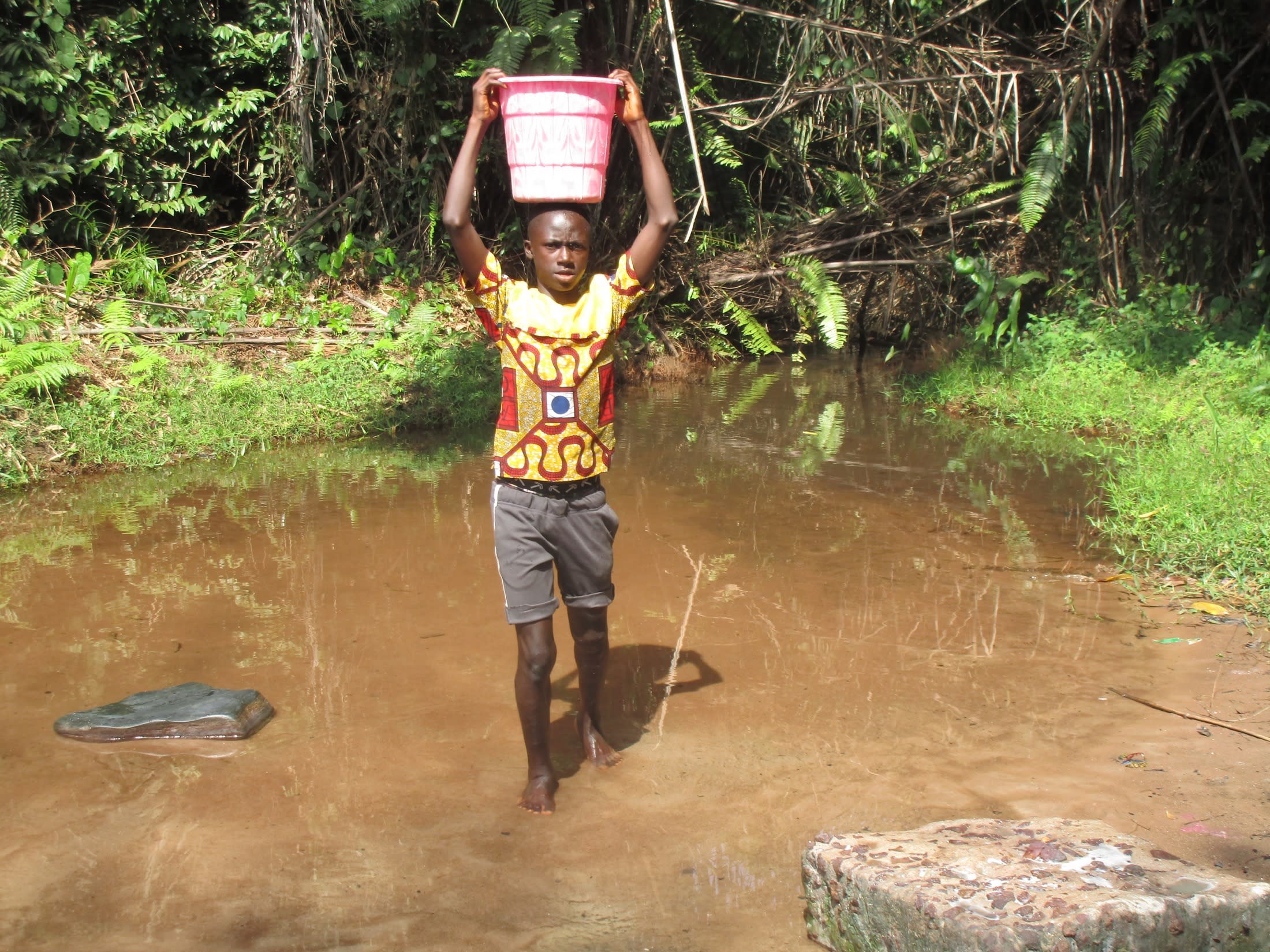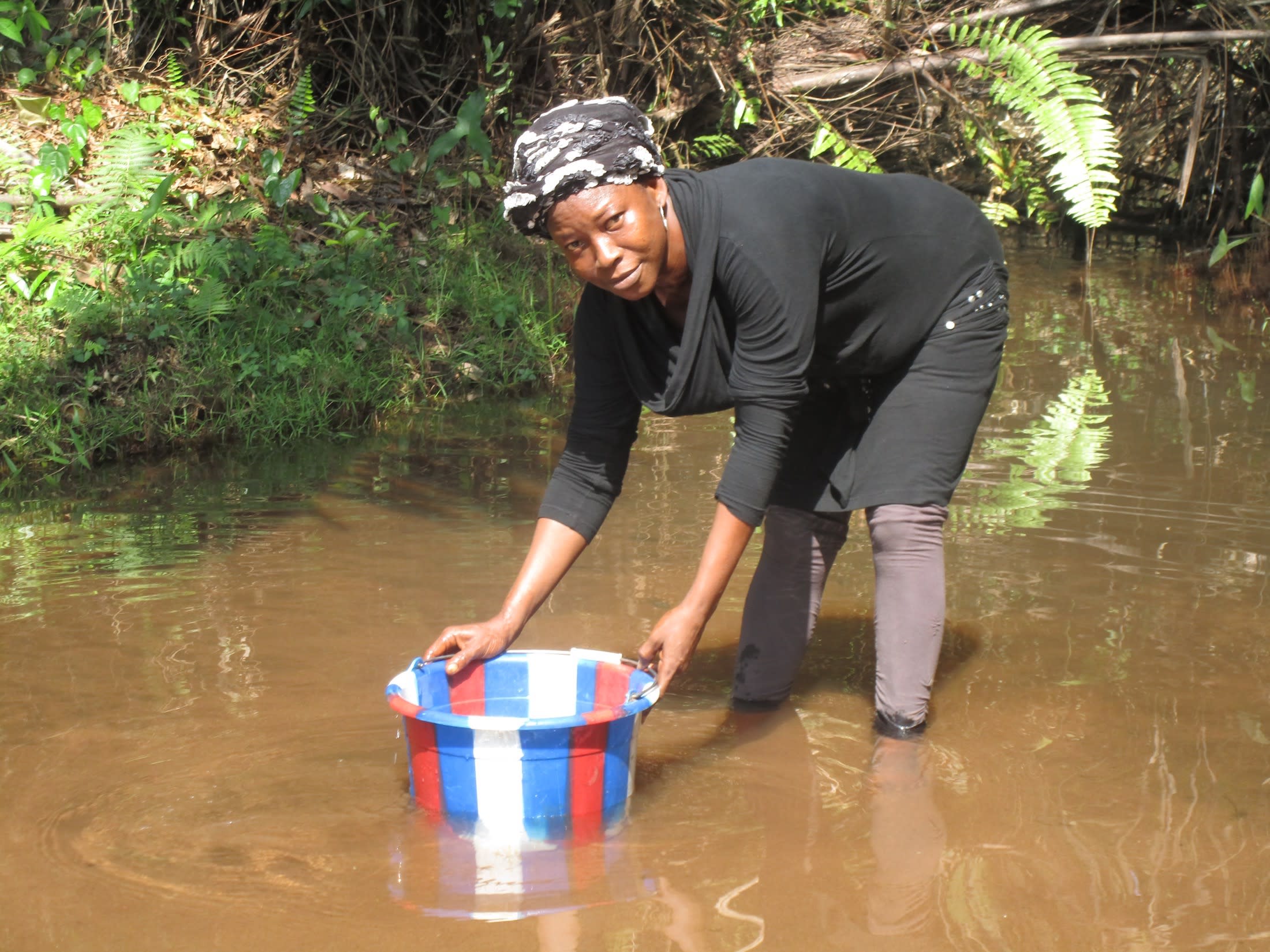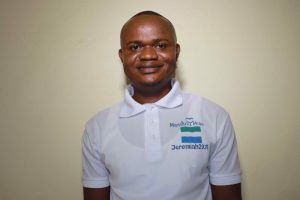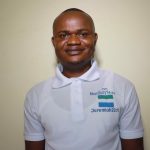November, 2022: Petifu Junction Community Well Rehabilitation Complete!
We are excited to share that a safe, reliable water point at Petifu Junction in Sierra Leone is now providing clean water to community members! We also conducted hygiene and sanitation training, which focused on healthy practices such as handwashing and using latrines.
"Now that we have a new water point, I would count it as a huge blessing for me because of the impact it has created," said 15-year-old Abu B., to whom we spoke when we first visited Petifu Junction. "This new water point will help me to fetch water with ease. I will no longer walk far distances [like] I used to walk before. Water will [now be] available at home because the well is very close to my house. I am also happy because the water at the well is clean, and this will prevent me from suffering from [the] water-related illnesses I used to experience."

Abu fills a container at the newly rehabilitated well.
"Now that we have this water point, I will be able to fetch water on time," Abu continued. "The reason is because the water point is close to my house. I will be able to do more trips for a day. Sufficient water will be available for us at home, and this can even serve us for at least two days or more, depending on the usage. My mum will have enough water to cook and launder at home. Therefore, the new water point will also enable me to go to school earlier. My performance in the subsequent examination will improve greatly because I will no longer miss lessons in school."

Abu celebrates with other community members.
"I will start my statement by saying thanks to God for bringing us this great privilege of getting access to clean and pure drinking water," said 46-year-old trader Jeneba Soboleh, another person we interviewed on our first visit to Petifu Junction.

Jeneba collects water at the rehabilitated well.
"I am extremely happy for this great event today," Jeneba continued. "It was very difficult for me to complete all activities on my daily schedule. I wholeheartedly believe that all the difficulties I used to face in fetching water will now become a thing of the past. I will now be able to do all my domestic activities on time.
"More especially, I will be able to pay more attention to my trade. I will utilize my time well because water is now available. I have no fear to drink from this water source because it is safe, clean, and pure. It is properly controlled, and the water from the well can serve this community."

District Councilor Abubakarr Bangura cups his water beneath the well's flow while Jeneba applauds in the background.
We held a dedication ceremony to officially hand over the well to the community members. Several local dignitaries attended the ceremony, including representatives from the Port Loko District Council and the Ward Council. Each official gave a short speech thanking everyone who contributed to the rehabilitation of the water project and reminding everyone to take good care of it. Then, Abu and Jeneba made statements on their community's behalf. The ceremony concluded with celebration, singing, and dancing.

Clean Water Restored
The drill team arrived the day before beginning work. They set up camp and unpacked all their tools and supplies to prepare for drilling the next day. The community provided space for the team to store their belongings and meals for the duration of their stay. The following day, the work began.
First, we raised the tripod, the structure we use to hold and maneuver each drilling tool. Next, we measured the well's original depth. We then socketed the pipes and installed a casing.

Finally, we lined up the drill rods and started to drill! We reached a final depth of 18 meters with water at 16 meters. The hand-drill method allowed the team to install the cylinder far below the aquifer so that the community has excellent water access throughout the year.
With drilling complete, we installed screening and a filter pack to keep out debris when the water is pumped. We then cemented an iron rod to the well lining and fixed it with an iron collar at the top.

Bailing.
Next, we bailed the well by hand for three days and flushed it, clearing any debris generated by the drilling process. Finally, we tested the yield to ensure the well would provide clean water with minimal effort at the pump.
As the project neared completion, we built a new cement platform, walls, and drainage system around the well to seal it off from surface-level contaminants. The drainage system helps to redirect runoff and spilled water to help avoid standing water at the well, which can be uncomfortable and unhygienic and a breeding ground for disease-carrying mosquitoes.

At last, we installed the pump and conducted a water quality test. The test results showed that this was clean water fit for drinking!
New Knowledge
Before conducting any hygiene training, we called and visited the local water user committee to understand the community’s challenges and lack of sanitation facilities. We shared the findings from our discussions with the committee members to help them make the necessary adjustments before the training began. For example, we identified households without handwashing stations or ones that may need to repair their latrines. With this information, community members worked together to improve hygiene and sanitation at home.
After this preparatory period, we scheduled a time when members from each household using the water point could attend a three-day hygiene and sanitation training. We then dispatched our teams to the agreed-upon location to hold the meeting.

Every household in Petifu Junction sent more than one representative to the training, and people participated by asking questions and contributing meaningful discussion points. Our facilitators were heartened by the community's commitment to change.
Training topics covered included handwashing and tippy taps, good and bad hygiene habits, disease transmission and prevention, COVID-19, worms and parasites, dental hygiene, proper care of the well's pump, keeping the water clean, the cost recovery system, dish racks and clotheslines, the importance of toilets, keeping latrines clean, balanced diets, the diarrhea doll, and HIV and AIDS.

One topic that prompted a lot of discussion was when our trainers urged the community members to visit a health clinic or hospital when they or their loved ones are ill rather than using traditional herbs or local witch doctors. Many of the community members confessed that this is the last thing they would do when their children are sick, with one woman even saying that the only thing health clinics provide for free is death.
The woman, Ya Fatmata Conteh, explained how she formed this opinion. When her young grandchild was gravely ill, she took him to the hospital. Even though the Sierra Leonean government says that all medical treatment for children under five should be provided free of cost, the staff there insisted that she pay exorbitant fees. But even after all paying for treatment, her grandson died, so she insisted that she would never set foot in a hospital again.

Community member discuss how diseases transmit from one person to another.
However, after a lengthy discussion among the facilitators and her fellow community members, Fatmata eventually relented, admitting that if another of her grandchildren becomes ill, she would take them to the local health clinic.
"I am now aware of the fact that we should never [delay] to visit the hospital for further investigations when we or our children get sick," said Jeneba, who was quoted earlier.
"We might harm or cause damage to our health in the process of taking traditional herbs or by visiting quacks who will give us wrong advice or provides us the wrong medications. It pleases me to be part of this training because I have got the opportunity to hear new things that are of great importance to my health. Through this training I have learned the proper way of taking care of my foods, water, and surroundings to prevent me and my family from getting sick."
Conclusion
This project required a substantial collaboration between our staff, our in-country teams, and the community members themselves. When an issue arises concerning the well, community members are equipped with the necessary skills to rectify the problem and ensure the water point works appropriately. However, if the issue is beyond their capabilities, they can contact their local field officers to assist them.
Also, we will continue to offer them unmatchable support as a part of our monitoring and maintenance program. We walk with each community, problem-solving together when they face challenges with functionality, seasonality, or water quality. Together, all these components help us strive for enduring access to reliable, clean, and safe water for this community.
With your contribution, one more piece has been added to a large puzzle of water projects. In our target areas, we’re working toward complete coverage of reliable, maintained water sources within a 30-minute round trip for each community, household, school, and health center. With this in mind, search through our upcoming projects to see which community you can help next!
Thank you for making all of this possible!




 Borehole Well and Hand Pump
Borehole Well and Hand Pump

































